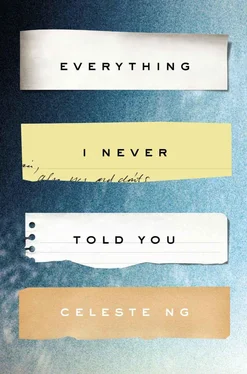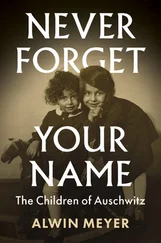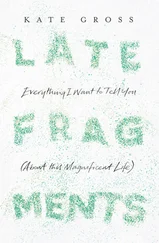In the locker room, Nath refused to say a word. He refused to put his clothes or even his shoes on, and when James held out his slacks for the third time, Nath kicked the locker so hard he left a dent in the door. James glanced back over his shoulder and saw Jack peeking through the door from the pool area. He wondered if Jack was about to speak, maybe apologize, but instead he stood silent and staring. Nath, who hadn’t spotted Jack at all, marched out into the lobby, and James bundled up their things and let the door swing shut behind them.
Part of him wanted to gather his son into his arms, to tell him that he understood. Even after almost thirty years, he still remembered P.E. class at Lloyd, how once he’d gotten tangled up in his shirt and emerged to find his pants missing from the bench. Everyone else had already dressed and was stuffing gym uniforms into lockers and lacing shoes. He had tiptoed back into the gym, hiding his bare thighs and calves behind his knapsack, looking for Mr. Childs, the P.E. teacher. By then the bell had rung and the locker room had emptied. After ten minutes of searching, mortified at being in his undershorts in front of Mr. Childs, his pants were revealed under a sink, legs tied around the U-bend, dust bunnies caught in the cuffs. “Probably just got mixed up in someone else’s things,” Mr. Childs had said. “Hurry along to class now, Lee. You’re tardy.” James had known it was no accident. After that, he had developed a system: pants first, then shirt. He had never told anyone about it, but the memory clung.
So part of him wanted to tell Nath that he knew: what it was like to be teased, what it was like to never fit in. The other part of him wanted to shake his son, to slap him. To shape him into something different. Later, when Nath was too slight for the football team, too short for the basketball team, too clumsy for the baseball team, when he seemed to prefer reading and poring over his atlas and peering through his telescope to making friends, James would think back to this day in the swimming pool, this first disappointment in his son, this first and most painful puncture in his fatherly dreams.
That afternoon, though, he let Nath run up to his room and slam the door. At dinnertime, when he knocked to offer a Salisbury steak, Nath did not respond, and downstairs, James allowed Lydia to nestle against him on the couch and watch The Jackie Gleason Show. What could he say to comfort his son? It will get better? He could not bring himself to lie. Better just to forget the whole thing. When Marilyn arrived home early Sunday morning, Nath sat sullen and silent at the breakfast table, and James said merely, with a wave of the hand, “Some kids teased him at the pool yesterday. He needs to learn to take a joke.”
Nath bristled and glared at his father, but James, cringing at the memory of all he had left out— Chink can’t find China —didn’t notice, and neither did his mother, who, preoccupied, set bowls and the box of cornflakes in front of them. At this last outrage, finally, Nath broke his silence. “I want a hard-boiled egg, ” he insisted. Marilyn, to everyone’s surprise, burst into tears, and in the end, subdued and unprotesting, they all ate cereal anyway.
It was clear to the entire family, however, that something had changed in their mother. For the rest of the day, her mood was sulky and stormy. At dinner, though they all anticipated a roast chicken, or a meat loaf, or a pot roast — a real meal at last, after so many Swanson’s dinners warmed in the oven — Marilyn opened a can of chicken noodle soup, a can of SpaghettiOs.
The next morning, after the children went to school, Marilyn pulled a scrap of paper from her dresser drawer. Tom Lawson’s phone number still stood out, sharp black against the pale blue college rule.
“Tom?” she said when he answered. “Dr. Lawson. It’s Marilyn Lee.” When he didn’t reply, she added, “James Lee’s wife. We met at the Christmas party. We talked about me maybe working in your lab.”
A pause. Then, to Marilyn’s surprise: laughter. “I hired an undergrad months ago,” Tom Lawson said. “I had no idea you were actually serious about that. With your children and your husband and all.”
Marilyn hung up without bothering to reply. For a long time, she stood in the kitchen by the phone, staring through the window. Outside, it no longer felt like spring. The wind had turned biting and dry; the daffodils, tricked by the warm weather, bent their faces to the ground. All across the garden, they lay prostrate, stems broken, yellow trumpets withered. Marilyn wiped the table and pulled the crossword puzzle toward her, trying to forget the amusement in Tom Lawson’s voice. The newsprint clung to the damp wood, and as she wrote in her first answer, the pen tore through the paper, leaving a blue “A” on the tabletop.
She took her car keys down from their hook and lifted her handbag from the entry table. At first she told herself she was just going out to clear her head. Despite the chill, she rolled the window down, and as she circled the lake once, twice, the breeze snaked its way beneath her hair to the nape of her neck. With your children and husband and all. She drove without thinking, all the way through Middlewood, past the campus and the grocery store and the roller rink, and only when she found herself turning into the hospital parking lot did she realize this was where she’d intended to come all along.
Inside, Marilyn settled in the corner of the waiting room. Someone had painted the room — walls, ceiling, doors — a pale, calming blue. White-hatted, white-skirted nurses glided in and out like clouds, bearing syringes of insulin, bottles of pills, rolls of gauze. Candy stripers buzzed by with carts of lunch trays. And the doctors: they strode unhurried through the bustle like jets cutting their steady way through the sky. Whenever they appeared, heads turned toward them; anxious husbands and hysterical mothers and tentative daughters stood up at their approach. They were all men, Marilyn noticed: Dr. Kenger, Dr. Gordon, Dr. McLenahan, Dr. Stone. What had made her think she could be one of them? It seemed as impossible as turning into a tiger.
Then, through the double doors from the emergency room: a slender dark-haired figure, hair pulled back in a neat bun. For a moment, Marilyn could not place her. “Dr. Wolff,” one of the nurses called, lifting a clipboard from the counter, and Dr. Wolff crossed the room to take it, her heels clack-clacking on the linoleum. Marilyn had seen Janet Wolff only once or twice since she’d moved in a month before, but she would not have recognized her anyway. She had heard that Janet Wolff worked at the hospital — Vivian Allen, leaning over the garden fence, had whispered about late shifts, the Wolff boy left to run wild — but she had pictured a secretary, a nurse. Not this graceful woman, no older than she, tall in black slacks, a white doctor’s coat loose around her slim frame. This Dr. Wolff, a stethoscope looped around her neck like a shining silver necklace, who with expert hands touched and turned the bruised wrist of a workman, who called clear and confident across the room, “Dr. Gordon, may I have a word with you about your patient, please?” And Dr. Gordon put down his clipboard, and came.
It was not her imagination. Everyone repeated it, like a mantra. Dr. Wolff. Dr. Wolff. Dr. Wolff. The nurses, bottles of penicillin in hand: “Dr. Wolff, a quick question.” The candy stripers, as they passed by: “Good morning, Dr. Wolff.” Most miraculous of all, the other doctors: “Dr. Wolff, could I ask your opinion, please?” “Dr. Wolff, you’re needed in patient room two.” Only then did Marilyn finally believe.
How was it possible? How had she managed it? She thought of her mother’s cookbook: Make somebody happy today — bake a cake! Bake a cake — have a party. Bake a cake to take to a party. Bake a cake just because you feel good today. She pictured her mother creaming shortening and sugar, sifting flour, greasing a pan. Is there anything that gives you a deeper sense of satisfaction? There was Janet Wolff striding across the hospital waiting room, her coat so white it glowed.
Читать дальше












